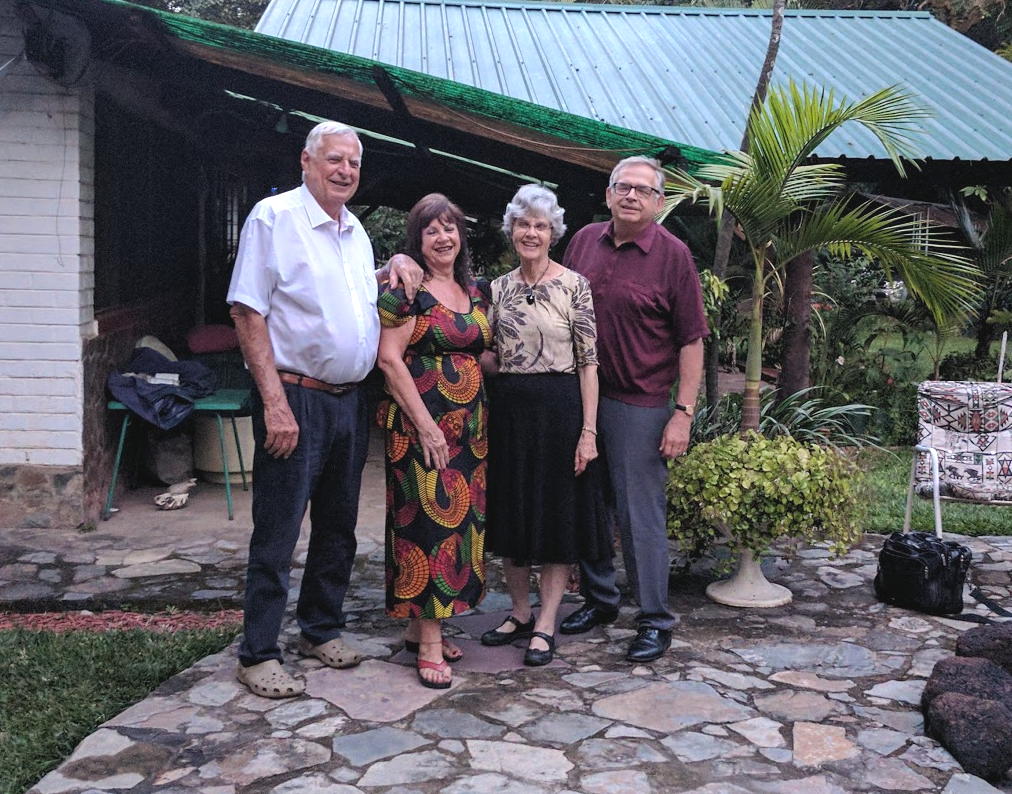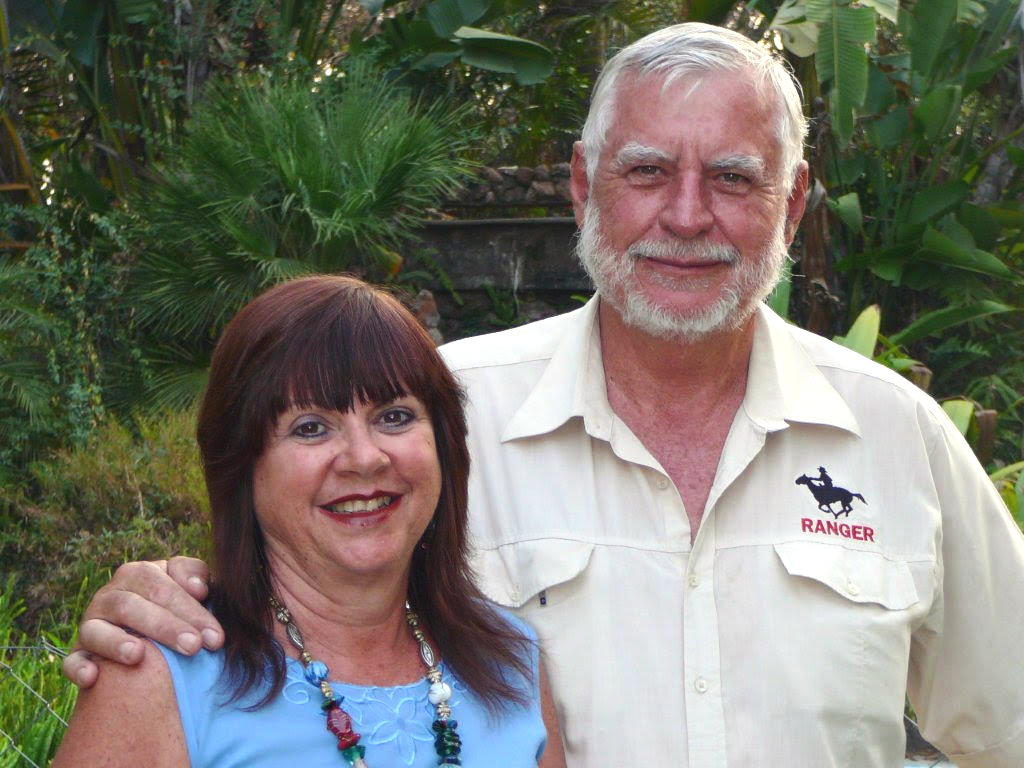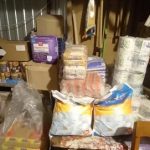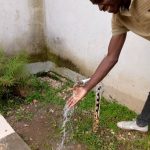This is an amazing story about Derrick and Cherry Pringle who lived in Rhodesia, now Zimbabwe, during the civil war that ended officially in 1979, yet violence persisted beyond that time against the white population. Derrick Pringle tells this heart-rending story of violence, yet an inspiring story of protection from God and His ever presence in the lives of those who turn to Him.
--Victor Kubik
Written in 1984 by Derrick Pringle
Let your conduct be without covetousness; be content with such things as you have. For He Himself has said, "I will never leave you nor forsake you." So we may boldly say: "The Lord is my helper; I will not fear. What can man do to me?" (Hebrews 13:5-6)
No man shall be able to stand before you all the days of your life; as I was with Moses, so I will be with you. I will not leave you nor forsake you. Be strong and of good courage, for to this people you shall divide as an inheritance the land which I swore to their fathers to give them. Only be strong and very courageous, that you may observe to do according to all the law which Moses My servant commanded you; do not turn from it to the right hand or to the left, that you may prosper wherever you go. This Book of the Law shall not depart from your mouth, but you shall meditate in it day and night, that you may observe to do according to all that is written in it. For then you will make your way prosperous, and then you will have good success. Have I not commanded you? Be strong and of good courage; do not be afraid, nor be dismayed, for the Lord your God is with you wherever you go." (Joshua 1:5-9)
There are a few events in my life since baptism which supports the above heading and of which I wish to record so that my family and I will never forget it. When time dims the memory or bad times fall upon us, then we can read these events and know for a surety that God is always on our side.
My wife, Cherry and I were baptised on a farm called Llandebie, in the Umvuma area of Rhodesia (now Zimbabwe), on the 5th February 1978, by a Mr. Ron Stoddart. We went down in my Landrover to a small stream that was running through the property and it was that time of year when horseflies were most prolific. It was most difficult for the minister and us to concentrate on the blessing afterward, as the flies bites were most painful, finding three wet bodies submissive to their attacks, no doubt caused them great joy. I immediately had my first trial as the stubborn old Landrover refused to start and I had to crank it a few good times before it responded. How I would have loved to have cursed it!
When my wife and I first got married, (date 20/3/76), we lived in a caravan as we had no home or even furniture. I was employed by the Government as a Surveyor, but due to the terrorist war, all outlying areas where there was work were closed so my main duties were involved in Land Inspectorate work.
During this time we heard of a farmer who had a vacant house on one of his farms, of which we saw and liked. This was on Llandebie – there was no electricity but it was our first home and also it was free. It was a lovely big roomy house with a large verandah around it, set amongst evergreen Chagata trees. One of the features about it that we particularly liked was that it had a fireplace in the bedroom. As we both loved the outdoor life, it was so relaxing to lay in bed at night seeing and listening to the fire crackling away.
In time, our finances improved and I hired the next door farm, Vosges, and also my father’s farm, Anstruther and cattle at Lalapanzi. We did well out of this venture, breeding on my father’s farm and then fattening them on Vosges. I used to burn the vleis in August and by September had lovely green grass. It cost me $2/head to fatten producing prime stock which returned about $200/head – good prices for those days.
Then the war intensified and conditions worsened. We had to put up a large security fence around the house with listening devices and flares at strategic points. We were very isolated, miles away from our nearest neighbour and very close to Chilimanzi T.T.L., which was a haven for the terrorist to live in and operate from.
My responsibilities had grown by this time, as now we had a small baby, Colville Royal, born 13/9/78, so we armed ourselves heavily – F.N. automatic rifle, rifle grenades, hand grenades, plenty of ammo (7,62mm) and were in constant radio contact to our neighbours and the Police who were 15 miles away. Landmines were being used more frequently so I had my Landrover mine-proofed with heavy metal plates bolted and welded on the undercarriage complete with roll bars. This was not foolproof because if you did not come out alive after a blast, your spine and ears would have been a health problem throughout the remainder of your life.
I also fitted K.Q’s to the Landrover – these were ten shotgun barrels on either side of the vehicle (20 in all), situated on top of the cab, which could be triggered from inside the cab. The idea was that if one got involved in an ambush, a broadside would hopefully create havoc and allow me to escape. After I fitted this lot I took my wife for a ride and secretly triggered off one side. Ten triple A’s going off at once is pretty loud, especially when your head is only about two feet away, so if it were possible for her to jump out of her skin, she surely would have done so.
There were church members from Salisbury (Harare) who severely criticized me for all these armaments, but every night they slept in a snug bed right in the middle of town and never ventured off a tar road.
I am thankful that God never allowed me to get into a situation where I had to use these weapons and also that I had no blood on my hands. Maybe I looked so fierce and aggressive that would-be attackers looked for easier prey.
We started having vandalism and veld fires and wood thefts, and just with one African I used to chase the culprits far into the T.T.L. I always felt quite confident that if I ran into a bunch of terrs (they moved in groups of ten or twelve), I could handle them without much problem. This now reminds me of Leviticus 26:8 which reads: "Five of you shall chase a hundred, and a hundred of you shall put ten thousand to flight; your enemies shall fall by the sword before you."
As law and order broke down, so did the control of cattle diseases. Dips were broken up and tick diseases killed cattle by the thousands and also the dreaded foot and mouth disease took over large areas of the country where foot and mouth had never been before. Extra manpower was needed so I was secondary to the Veterinary Department, checking farmers cattle for signs of F & M. Sometimes if F & M was found, we injected the whole herd so that the disease would not linger in the herdr for long. My best record was 800 in one hour. Experienced men could do 1000 head an hour. It was a pathetic sight seeing the animals limping around with saliva pouring out of their mouths and getting thinner every day. A lot would die and some would never recover.
It was during this time that I was inspecting a farmer’s cattle – Ron Cullinan the owner had a lot of influence in Lalapanzi. I got on well with him and he was concerned over our safety where we were living. I was also worried about leaving my wife and child alone so far out in the bush. The atrocities by the terrorists were most brutal and cruel and one could expect no mercy.
While having lunch with Ron and his wife Madge, he said that he could get me a vacant mine house at Lalapanzi for only $10/month. I was going in that direction so I said that if he could arrange it, I would go and see it. Ron promptly got on the phone and at 3 o’clock that afternoon I was inspecting the house with the Mine Manager. This was on a Wednesday. That evening my wife and I discussed whether to move or not and it was a difficult decision to make as we loved it where we were and did not fancy living in a small miners town. I suddenly made a decision – I’m sure inspired by God’s Holy Spirit as later events proved – I told Cherry to go and inspect the house the next day (it was the only house available), take a few labourers on Friday to clean it up and we would move that weekend.
What a rush – Ron lent me his truck but by Sunday night we were living in our new home. It was exciting as now we had electricity but also we had nothing to use it on as our appliances were either gas or paraffin. To save paraffin at our last home we only lit up when it got really dark – so here in our new home we would blunder around in the dark and then suddenly remember that all we had to do was push a switch and hey, presto – there was light.
Now the next week on Thursday, I was inspecting cattle on a vacant farm (A year later I bought these cattle at a very cheap price), when in the distance I heard a series of explosions. I was near the T.T.L., and about 15 Kms from Vosges. I was supposed to be at Vosges that day as someone was inspecting my cattle (Boet Koen), but I had too much of a workload and had asked Boet if he would check my cattle on his own.
That night when I got home I learnt the horrible facts. Leading down to the old homestead at Vosges was a beautiful avenue of old gums (trees) and as Boet was driving down, the terrs had set up a rocket launcher armed down this lane – it hit the right side of the Landrover, burnt its way through the radiator then the steering box and then seered Boet’s left leg off. He fell out of the car which was now well alight and tried to hobble off on his one leg, but the terrs mowed him down with automatic rifles.
That previous evening the terrs had slept at our home at Llandebie - They broke every window-pane (100 +) and some of our furniture that we had not had time to move yet. They killed and I suppose ate all our fowls and spitefully trampled down Cherry’s flowers – Black eyed Susies. My Boss Boy had disappeared and only years later were his bones found stuffed in between some granite boulders. As the terrs had rockets I wonder how we would have fared against an attack on our own at Llandebie – and we had only moved a week before. I also wonder how I would have fared if I had been with Boet on that fateful day.
Once I was injecting cattle about 30 miles from Lalapanzi in the Tokwe area. It was a bad area and advisable to get out by 4:00 p.m. But I was hoping to finish the herd that day so only left after sundown. The roads, of course, were all dirt, winding, and twisting. By 7 o’clock Cherry was very worried, ‘phoning everyone and I eventually trundled in by about 8 o’clock to a very mixed reception! Then Cherry said that I was lucky to have a helicopter to escort me home. “What ‘Copter”, I asked. “Didn’t you see the lights that were on you - They were very bright and only went off when you got near the house?”, she replied. Well I was the only car on the road (no-one travelled at night), and I certainly did not see any lights or hear any ‘copter. Surely an angel of God protected me that night.
The next day I was back down in the Tokwe area early as I still had cattle to inject. About 20 miles down the road I came across the Police. The terrs had dug a channel across the road and set up an ambush point nearby. Were they there when I passed the previous evening and what made them leave that area so no ambush took place? It was not long after this, near that spot, that a friend’s wife, Ann Evans, hit a landmine with a Landrover and got killed. She was so young too – only about 23 years of age.
Once I had to go and inspect Ronnie Lea’s cattle about 25 miles from Lalapanzi along a very winding twisting road, which in peaceful times was a pleasure to drive along. It wound amongst granite kopjies and passed over little streams of water. A thousand good ambush points along the whole road. As I traveled I passed a burned out farmer’s home. This was the Hutchinsons.
They were resting one Sunday afternoon when the terrs broke into their home and killed both of them. Mrs. Hutchinson was 8 months pregnant and apparently, a few things were done to her before she died. They had two sons about ages 4 and 5. The farm labourers were herded to the house, the two boys were presented to them, and the terrs said, “This is what is going to happen to all the white masters.” They then took the lads by their feet, swung them around and bashed their heads against the farm house walls until they were dead.
Now Ronnie Lea and I were good friends and I used to plan my trip so that I could have lunch with him and we would waffle about all sorts of things like farming and politics – an ever-ending source of conversation. About 8 miles from Lea’s place was a neighbour – Tony Bauman. As I was passing his place, Tony stopped me. Mr. Lea had phoned Tony to stop me. His labourer had not come to work and only two had pitched up so he couldn’t round up any cattle. Therefore, it was not necessary for me to visit him. I did think this was strange as I was so close already that I might as well have gone that little distance and we could have had a good chat, even if no work was done. Tony had also made a special effort to wait on the road to pass on Mr. Lea’s message. However, Tony invited me in for lunch and we had a very pleasant time indeed.
That night, Mr. Lea phoned me. With the two labourers that he had, he decided to round up some cattle that were near the homestead. They got about 100 head or so into the kraal. Mrs. Lea was in their Landrover on the other side of the kraal’s fence and as Mr. Lea had wild Brahman cattle, it was a very well built fence. Mr. Lea was inside the kraal standing under a Jacaranda Tree with his F.N. Then the terrs opened up on him. His F.N. jammed as he tried to return the fire. Mrs. Lea threw out her Uzi to him and her arm got nicked by a bullet as she did so. Anyway, Mr. Lea managed to get through the fence and they drove off to safety unharmed. I inspected the scene a few days later. The Jacaranda Tree was riddled with bullets and if Mr. Lea had not thought of stopping me, I possibly would have been standing with him and might have been seriously injured or killed. On inspecting the actual ambush spot, I picked up armour piercing cartridge shells, so their firepower was really quite terrible – what made Mr. Lea phone me?
My heart was really set on going farming full time, so we bought a dilapidated farm just outside Gwelo called Indiva. I thought it would make an ideal dairy farm. So we built up the dairy, got 12 acres of irrigation going and eventually were doing fairly well. But we did have our problems, especially after Independence when the political stench started affecting my labourers. In two separate incidences, we had $20,000 worth of cattle stolen. We also, out of the blue, contracted Anthrax, wherein we had to throw all our milk away for 10 days. At this stage, we were struggling financially so this was a great blow to us. I felt then that we should have been protected considering Deuteronomy 28:1 - "Now it shall come to pass, if you diligently obey the voice of the Lord your God, to observe carefully all His commandments which I command you today, that the Lord your God will set you high above all nations of the earth. And all these blessings shall come upon you and overtake you because you obey the voice of the Lord your God." I only lost 4 head out of a total of 200 when I could have expected a loss of at least half that amount.
We then decided to sell because of our problems and also to get near a church – which was about 170 miles away. We got a very good buyer – Mr. Jan Bronkhurst- a very successful dairy and ranch farmer. He tried to borrow the money through a finance body, the A.F.C. Jan told me that even if he did not get the money he would sell cattle to buy the property. Well, everything fell through and now Jan didn’t want the property. So I went over our assets, increased their value by $30,000 and a month later sold the whole lot to the Government for cash. Now we felt that God had let us down with the first deal, but the final result was the best. We sold just in time too because the next season was a drought year and the 100 acres of maize that I would have needed for my cattle would have been a complete write-off as my farmer neighbours all had no returns from their crops.
We could not decide whether to move to Bulawayo or Salisbury (Harare) but eventually decided on Salisbury as that was where the main church was. This was a wise move as later and still to this day a lot of opposition to the present government is taking place and to date over 60 farmers and their families have been killed in that area (Bulawayo).
We bought a beautiful old house on 50 acres at Umwinsidale and spent a fair amount getting all in order. But after a year I found out that it was too small and we decided to sell it and buy a bigger farm. Once again, after much prayer, we found a buyer. He had the cheques written out and had even dug trenches to lay cabling for lights along the security fencing. At the very last minute, he pulled out – how disappointed we were. Then a week later along came a cash buyer (Mr. Frost), who paid us $10,000 more than the previous buyer.
The following season was also very bad and we did rely on water from a stream so I wonder how much, if any, water is there now. I also heard that a lot of thieving is taking place – In fact the owners have had a hi-fi, radios, and fridge stolen.
We then bought a sheep farm at Nyabira in 1982, which was 35 Kms from Harare. At that time sheep was in big demand and prices were good but within two years that changed rather radically. Costs skyrocketed, ESC up 160%, fuel 45%, fertilizer 40%, etc., and the main market for lamb was over produced and difficult to sell.
We now had two children, one of school going age and the conditions in the schools were becoming highly unsatisfactory, so we decided that we had to sell and move to South Africa. Our financial position grew worse and we just could not get a buyer. The general economy in the country was bad and no money was available to prospective buyers. So after much fasting and prayer we got a buyer. His terms were not very good and at the end of it we would have come out with nothing, but at least we would have been clear of our debt and could move. Once again, at the last minute he ‘phoned us and canceled the deal. The estate agents told us that small holdings were not moving and when they did, the seller had to drop his price and give very generous and lengthy terms.
Two days after this sale fell through, another buyer inspected the property – (Mr. Baldwin). He seemed impressed but we heard no more from him for about six weeks. Then he came back and wanted the farm. In the meantime, he had inspected 25 farms around Harare before deciding on ours. We had to drop our price slightly but still it was a cash deal and did not include the livestock, so we made up some money that way. We only had six weeks to move and it was a terrible period trying to sell our livestock and other goods, packing and still running the farm, but eventually, all was sorted out and now our big move to South Africa takes place in September 1984.
(May be continued in 5 years time).






